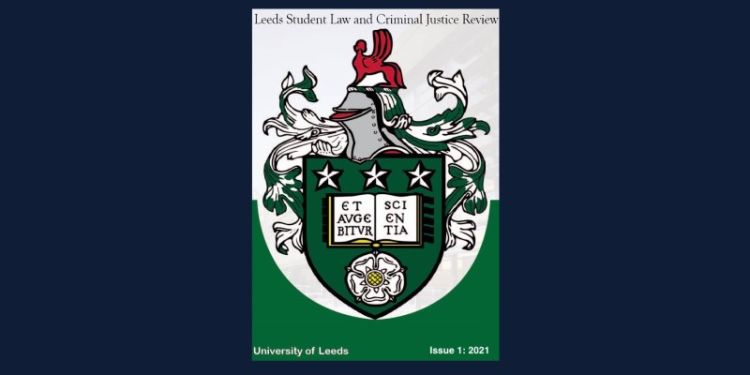School of Law produces inaugural issue of the Leeds Student Law and Criminal Justice Review

The review is written and edited by School of Law students and PhD researchers, and comprises a diversity of subject specialisms, methodologies, approaches, and voices.
We spoke to 2020/21 Managing Editor Maariyah Islam (PhD researcher), and Dr Colin Mackie, the member of staff who helped to found the Leeds Student Law and Criminal Justice Review (LSLCJR), about why it was started, challenges with producing a review during a global pandemic, and plans for the future.
Why was the Leeds Student Law and Criminal Justice Review started?
The LSLCJR was created for two main reasons. First, to showcase the truly outstanding quality of the research that our undergraduate students undertake each year for the culmination of their degree, the dissertation (a 10,000-word research article that students will work on for the bulk of their final year).
The students devise their own research question, conducting sustained research on a subject that they had become interested in during their degree. They benefit from one-to-one supervision by a faculty expert in the field. Each year, several of the dissertations are of a publishable quality and the LSLCJR provides a route to publication. An immense amount of work will have been put into the dissertation by the student and its publication is a reward for that effort.
Second, the journal provides invaluable experience for the editorial board. The board comprises PhD researchers within the School of Law, many of whom wish to move into a career in academia upon completion of their thesis. The opportunity to obtain editorial experience will not only aid their own writing through the close attention that must be paid to argument formulation by authors, attention to the quality of the sources relied on to substantiate points and the conclusions drawn in submitted manuscripts, but it provides insights into life as an academic. Editing a submission requires focus, an inquisitive and agile mind, determination and a desire to work collaboratively to produce the best piece of work possible, all attributes valued in academia.
The excellence of the articles and the energy of the editorial board to help authors finalise the dissertations ready for publication is something that the School of Law, as one of the top 10 Law School’s in the UK, can be very proud.
How are submissions chosen?
The board reviewed the submitted articles and selected those that are to be published based on the quality of the writing, the rigour of research undertaken and the originality of the analysis/findings. The board then worked in pairs to prepare the submission for publication. The LSLCJR will publish articles on any law, or criminal justice, related topic, and aim to see a wide array of topics and issues covered.
What have the challenges been with producing the inaugural edition of the LSLCJR?
The 2021 issue of the LSLCJR was produced under the most unusual of circumstances, with the editorial board working remotely, but collaboratively, to prepare the manuscripts for publication. As it was the inaugural issue, there was a huge amount of groundwork for the board to do, such create a website, devise the layout of the journal and corresponding with potential publishers, all whilst balancing this with their PhD research.
With the outstanding leadership of the Managing Editor, Maariyah Islam, the board has done incredibly well to produce a publication of such high quality. The board showed agility, creativity and a willingness to adapt to, and thrive in, difficult conditions. They should be very proud of their efforts.
Are there plans to expand the journal?
For the 2022 issue, we are considering expanding the LSLCJR to encompass submissions from Postgraduate Taught students and PhD researchers. There are also plans to circulate hard copies of the journal to the libraries of leading universities across the world when circumstances allow. We will circulate copies of the inaugural issue as soon as possible.
View an electronic copy of the inaugural issue.
Issues of the LSLCJR will also be available on Heinonline from May 2021.
2020/21 Editorial Board
Managing Editor: Maariyah Islam
Assistant Managing Editors: Kisby Dickinson and Clare James
Editors: Ananya Banerjee, Atif Bostan, Amy Gainford, Natasha Gooden, Ibukunoluwa Iyiola- Omisore, Peter Ochieng and Tu Tran.




